Photos by Steve Wood
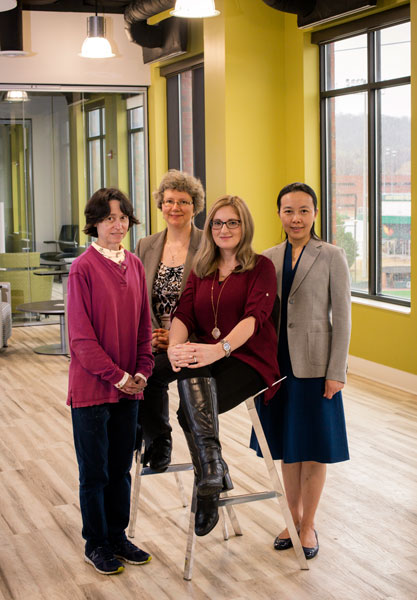
Why do girls lose confidence in their science and math abilities when they reach pre-adolescence? What are the barriers that block women's progress through graduate school? What is it like to be the only woman in your department?
We asked four of our female faculty members these questions—and more—at a lively and thought-provoking discussion on what it’s like to pursue an academic career in the sciences. Dr. Eugenia Kharlampieva from the Department of Chemistry, Dr. Karolina Mukhtar from the Department of Biology, Dr. Mary Ellen Zvanut from the Department of Physics, and Dr. Tracy Zhang from the Department of Computer Science shared stories of their education, their professional advancement, and their new roles as mentors to female junior faculty, graduate, and undergraduate students. They also offered thoughts on what we can do to ensure that more girls prevail in reaching their goals to be scientists.
A&S Magazine: Why don’t you start by introducing yourselves?
Tracy Zhang: I’m Tracy Zhang from the Department of Computer Science. I got my Ph.D. from Florida International University and joined UAB as an assistant professor after that in 2004. I’m a full professor and also the graduate program director in the department.
My research focus is on multimedia databases and data mining. Anything to do with object detection in videos, or image classification in videos; for example, extracting events from surveillance video, or videos from the biomedical field—I can be of help. I’m originally from China.
Eugenia Kharlampieva: Hi, I’m Eugenia. I’m originally from Russia and I’m an associate professor of chemistry. I do polymer chemistry, so biomedical applications for polymer materials, for drug delivery, or cell transplantation.
I came to UAB in 2010, but my career path was not traditional. I was trained as a medicinal chemist in Russia and I worked four or five years in the industry. Then I decided to explore a new direction so I got a master’s in linguistics and cultural communications. [As a chemist], I worked in a company and got promoted to a lead scientist in Russia, but I wanted to explore my new potential as a linguist. I was applying to graduate school in linguistics, and then my master supervisor in organic chemistry called and encouraged me to apply to grad schools in the U.S. I said, “No I’m done with chemistry. I’m going to be a big translator,” but then he convinced me that if I got my chemistry Ph.D. in the U.S., I could practice my English and I would be a more successful interpreter and translator. So, I came to the U.S. in 2010 and fell in love with science and the people and realized I was looking for something interdisciplinary. What I do now is a cross between chemistry, biology, medicine, and engineering, while still doing translation every day. [laughs]
I received my Ph.D. in polymer chemistry/science at the Stevens Institute of Technology in Hoboken, New Jersey, and got my post-doc in biomaterials from Georgia Tech. My initial position at UAB was a little unusual: I was an interdisciplinary faculty member supported by Associate Dean for Research Dr. Yogesh Vohra—I was funded by the National Institutes of Health (NIH) for two years. I had multiple offers at the time, but I took this job [because it was] interdisciplinary and because of the facilities at UAB. I was tenured in 2015.
Karolina Mukhtar: I have also been here since 2010 and was also hired as an assistant professor. I’m from Poland and did all of my education up to my master’s in Poland in biology, all in my hometown. I never had to move away for college; I guess that was in my best interest. That was the first place I got interested in plant science, which is my current research area.
I was pretty traditional except for one gig. Straight from my master’s, I was offered a job in the same academic unit where I did my master’s, which was a cell biology lab. And these were really coveted, full-time, permanent research positions—there’s not really an equivalent in the U.S. But I hated the job: it wasn’t the right place for me, and I started looking for something else pretty quickly, just within the first few months. I applied for an internship at the Polish Academy of Sciences, which is a really good place. Even though my original intention for that internship was to just get out of where I was, it turned out to be life-changing, because I met great people there who showed me what science could be like and got me excited. While I was there, the head informed me of the Max Planck Research Institute, which was opening a [new location] in Germany, so I applied for their Ph.D. program. I got in, and during the interviews I also met my future husband so that was a really quick fix for my whole life. [laughs] I got my Ph.D. in genetics with a focus on plant diseases. After that [my husband and I] were pretty open to going anywhere for post-doc training. That ended up being Duke University for me, and I did that for a little over four years.
After I finished my post-doc, I decided to have a trial run [on the job market], and I applied for assistant professor positions at four schools. One of them called me back and that was UAB. I’ve only been to one job interview in my life and I hope it stays that way. [laughs] My lab studies plant immune systems and various types of plant stress responses.
A&S: And Eugenia and Karolina, you both won the National Science Foundation CAREER Award in 2014, correct?
Eugenia: Yes, that’s right.
Karolina: Yes, with Thamar Solorio and Ragib Hasan.
Mary Ellen Zvanut: My story's relatively simple. I got my bachelor’s-through-Ph.D. at the same institution up in Bethlehem, Pennsylvania at Lehigh University, not far from where I grew up. I did a post-doc at UNC Chapel Hill, then moved on the Naval Research Lab [in Washington, D.C.] before moving to UAB as an assistant professor in 1993 and I've been here ever since.
I research the materials they make your computers, cell phones, and electronic gadgets out of—and these new lights that are based on LEDs. I focus particularly on defects, which are not necessarily a bad thing. Actually, sometimes you need those defects to make devices work. We look at defects directly as well as their interactions with other materials.
I’m a full professor, associate chair and the graduate program director in the Department of Physics.
A&S: What are some of the pros and cons of being a woman in your field? Did you have a mentor who supported you? Have any of you had a negative experience? What are some of your stories?
Tracy: I have many stories. When I was a Ph.D. student at FIU, I remember one time I had to work into the early morning hours. I came back at 6:00 a.m. and one of my roommates, who was a male student, said, “You just came back from doing homework?” And I said, “Yes, I got the last bug fixed, so now I’m turning in the work to earn bonus points.” And he said, “Computer science isn’t for women.” He didn’t think it was an appropriate lifestyle for women, working late like that. Even my husband, who was also doing his Ph.D. during this time, [has had similar opinions]. We got to know each other when I was working late in the lab.
Karolina: Us too, there is no time for anything else!
[laughter]
Tracy: Right. But from the other point of view, I had a male dissertation advisor who was so supportive. He was so strong-minded but in a good way. He never gave up on me, even when I messed up badly, and there was a time early on that I did mess up really badly. He always held the standard high, but he was always extremely supportive. He would always say, “You are capable of doing anything, you can do it.”
I think the support from your male peers and your male advisors is very important. Because I think oftentimes the things that make girls or women in my field quit is a lack of confidence and support.
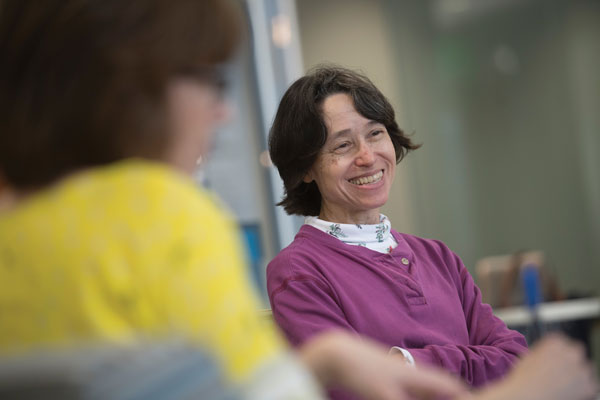
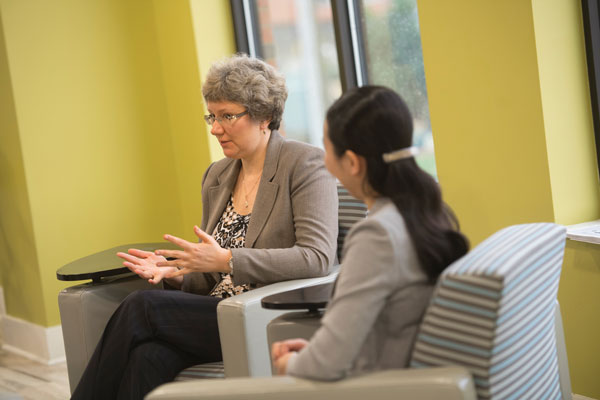
Karolina: I actually had female mentors all along and I just recently realized that. I have to tell you that, when I grew up in Poland I was completely unaware of the concept of gender inequality. My eyes were really opened when I was over 30 [years old] and I was here in the U.S. My boss made a comment, “You as a female may have a better chance of getting a job,” and I honestly had no idea where that was coming from.
I was always happy being a girl. But I did have an experience in the first lab I worked in, where I got my master’s, being there was a completely different story. Every single person there was female: the boss was female, 100 percent of the lab was female. And this is the other side of the story: Women can be amazing support, but they can also do a lot of damage when they aren’t the role models you need them to be. When I was hired, I was the most junior member of that group. I felt like an outcast, I wasn’t welcome, and they had ways of letting me know that. I was the one teaching late labs or Saturday morning labs because I was single with no children. I was the one going down the street to the deli to get their lunches. And so I realized, this is not the place where I’m getting the support I need, and at this rate it will take me forever to get my Ph.D.
My Ph.D. boss was female and she was a neutral figure in my life. My post-doc boss was another female and she was definitely a strong supporter and a great role model who helped me navigate through my own personal life choices through my post-doc, so I ended up coming out on the other side without too much damage and building a stronger case for myself. So, I had both: the good, the bad, and the ugly. [laughs]
We focus on the impact that male advisors have on female students, but being a female advisor is a whole different responsibility that we have toward our female students. Because there was a time in my life I seriously doubted I could stay in [academia] and if it hadn’t been for that internship, I’m not sure I could have stayed much longer.
Eugenia: Those stories are wonderful! I’ve been lucky. In Russia, we had the same situation as Karolina had, we didn’t feel that gender difference.
Karolina: It’s cultural.
Mary Ellen: My impression is there is a big cultural difference in Europe; they don’t have the same kind of social structure we do in this country. My sense always has been, because I’ve interacted with a lot of European men, that it’s very different than with Americans.
Eugenia: You know, I didn’t think about this. Out of 50 students in my class [in Russia], only three were guys—the rest were girls. And that felt normal because it was chemistry. If you went into physics or computer science, the ratio would be different, but it was never just 5 percent female. By the time we all graduated it was 50/50, male/female across all of the disciplines. But even when I first came to the U.S., I didn’t experience this gender difference because I happened to be in a lab with an assistant professor who was female. In my group, it was five women and only one man. And I was very lucky; she was very supportive. And we are all in that situation now, right? You take students and you are responsible for them. She was supportive at the time and I just thought it was normal.
When I did my Ph.D. at Georgia Tech, the environment was slightly different. It was engineering and it was more competitive, but again it was 50/50, female/male students.
When I came to UAB, I was the only female tenure-track professor out of maybe 15 in the department, and then it was an eye-opener. That’s when I realized, “Wow this is different.” But the department was very supportive so I didn’t notice at first; I just was focused on my work, but gradually it dawned on me. And I noticed it with my students. Girls are less confident and that was strange to me; I was always confident. But when I look at my students here, they are more hesitant to make decisions, they are careful in their experiments, they are very critical about what they do—self-critical. It can be a good thing to be careful and critical, but they are often more conservative than the guys. And to me, it seems like when they have a failure, they are much harder on themselves and it’s much harder for them to move on. I just feel like the girls need more encouragement than guys.
Tracy: I agree. That reminds me of another joke that’s very true and reflective of reality: When you tell a girl she did a good job, she might think, “What did I do wrong?” You should say: You did a great job, not a good job.
Mary Ellen: It’s interesting listening to the stories because not only are most of them not U.S.-based but they’re also much more recent, so it’s a completely different situation. I had no female mentor, it never occurred to me to have one. In contrast though, the first 12 years of my education my teachers were entirely female: they ran the school, they did everything. So, it didn’t occur to me even when I got to college that [women] couldn’t be in charge of something. Of course you could be in charge of things! Now I went to a heavily male-dominated school, my two best girlfriends were probably “the engineers” as undergraduates…there were probably more, but it was a very, very small percentage. I think out of a class of 100 electrical engineers, maybe five were women. I was a physicist; I may have been the only one, maybe a couple of others.
It was a very different experience, but I never really had any trouble. But physics is a very different environment: it’s small and maybe more encouraging because we need more physicists and we don’t care if they’re male or female! [laughs] But no, I shouldn’t joke. Women obviously don’t go into physics and there are a lot of stories about women not being encouraged, being told they couldn’t do math or they shouldn’t do math, and those are stories I’ve heard from friends and from students. I never experienced that, but I’m sure it was true and I dare say is probably still true. But I’ve been lucky. My research advisor was a gem to everyone. He had a wife who was a schoolteacher and daughters about my age, so he knew. But there were issues that I didn’t realize as a student, but he took care so that I didn’t realize them. He made sure that I got along.
A&S: What kinds of issues?
Mary Ellen: For example, we were going to a conference and remember it so well but I was so oblivious to it at the time. It was driving distance and I was a relatively new student and we were all going as a group. When we got there we had to spend the night, and I appreciate this now: It cost a lot for a hotel room. Should I have one of my own? Because usually everyone shares a room. But apparently this was a big topic of conversation in his house. His wife and daughters were all advocating that I get a separate room even though it cost a lot. But on the other hand, it does mean you’re cut off…a lot happens socially when you’re spending time in situations like that, I probably missed out on some things.
A&S: Eugenia, you addressed this earlier. What are everyone's perceptions of your female students?
Mary Ellen: I think the one thing we all have to keep in mind, even about us: we’re here, the graduate students who are here, they are the ones who persisted. Already the female students we see are the people who are willing to go the extra mile and fight the battles. I had a student here, she came from another institution, and she was basically told when you’re married and have kids, you shouldn’t be here. But she continued. It’s probably very challenging to them, but you shouldn’t say those kinds of things to anyone. All the female students I’ve worked with they’re much more aggressive than I would have been.
Karolina: Biology absolutely doesn’t have a problem with recruitment—more than 50 percent of our graduates are female, which is a national trend. And that’s also true at the master’s level and Ph.D. level, so we have quite a lot of trained female biologists. Our problem is the leaking pipeline. When you move up in the academic setting every step of the way, from post-doc to every level of faculty, we have a huge, precipitous drop in terms of the numbers and we probably get single digits, 10 percent at best, of full professors. So, our challenge isn’t the lack of motivated undergraduates; they start these careers. The problem is the girls flock into biology because they’re told not to go into computer science, chemistry, math, and physics and so biology is the STEM discipline they think they can handle, plus it has the connection to healthcare, which a lot of women would like. So they come to biology and suddenly we are left with this huge population, and they don’t even realize they are bottle-necking by all flocking together. I think biology has a unique problem of being too popular or being seen as easier. I’m an example, because I had to work really, really hard to get my A’s in math and physics, and I did, but it was more effort. I feel like a lot of girls would be like me and go down this path, but not be prepared for when it becomes more difficult down the road.
What’s also difficult is when these young women enter biology thinking they will go into medicine or nursing or another health profession and they aren’t accepted, then it is often too late for them to adjust into academia, because they don’t have the research experience they need to continue. We could definitely do a better job of mentoring this large female population we have into more diverse careers.
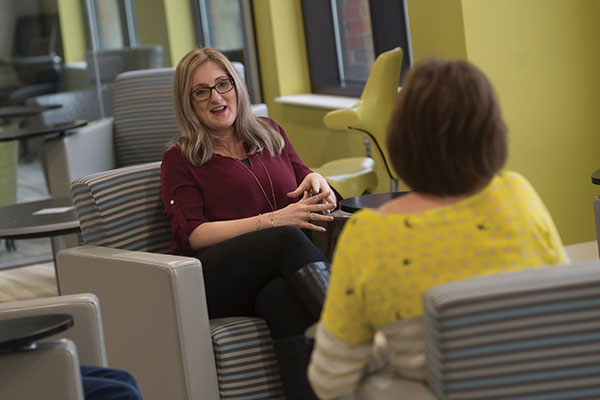
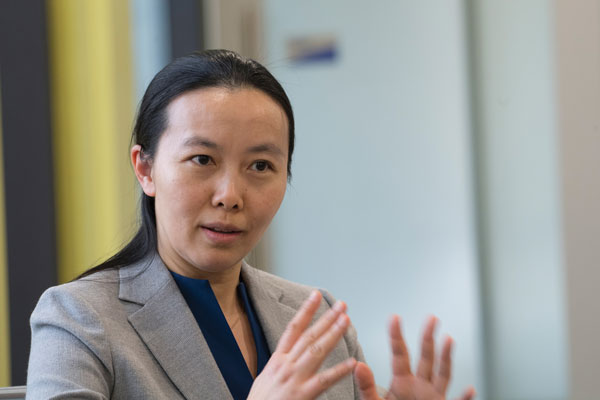
Eugenia: I feel so jealous of all those students!
Karolina: Too much is not always a good thing!
[laughter]
Eugenia: Of course, there are always exceptions. I’ve been here seven years and I would say yes, female students need more encouragement and more motivation. Their standards are often higher, which can actually have a negative impact. Maybe because I’m a female professor they feel they can't disappoint me more than a male student can? Maybe they’re more sensitive to that? I don’t know, I don’t have a controlled experiment. [laughs] But I agree with Karolina that the retention of female professors in our field is much lower than male professors. In fact, look at our department, we have only two tenured or tenure-track female professors.
Tracy: I’m the only one in my department.
Mary Ellen: I’m the only one in mine, too.
Eugenia: The search committees say, “We need to bring more female [applicants]!” But how are you going to do that when you have out of 100 applications only 10 are female?”
Tracy: Same here. But I don’t ever feel isolated. They asked me, “Will you have a problem being the only woman in this department?” and I said, “No!”
A&S: What can UAB do to support you and your students? What do we do well, and what can we do better?
Karolina: I am a mom of two little daughters so I have that insight and they are both elementary-school age right now. One of them came back home from preschool and said she wished she could be an astronaut, but she couldn’t because she was a girl. And that was the point where I knew I had to do something. Because she’s spending days with people who have told her something like that, because I can assure you she hasn’t heard it at home. We started working hard to find summer camps and after-school activities to immerse them in science and programming and basic engineering. It’s not my interest and it may not be theirs either, but it’s just an alternative to cheerleading and gymnastics. We as a female faculty—we all do outreach activities obviously very heavily—but something UAB could probably do better is programs for younger girls.
Tracy: Right. Some of our faculty offer the Girls Who Code training camp, but that’s purely on a volunteer basis.
Karolina: So yes, targeting them earlier, because once we already have them as undergrads the damage is often already done. Research shows that it’s during the preteen years that the whole math/physics thing kicks in that, “This is not for me.”
It’s so frustrating, I see it among my female mentees, there could be a student that could be doing so well for years and is planning on having an academic career, but in the final year she tells me, “It’s actually going to be really hard.” It breaks my heart but they say, “I’ve been looking at you and it looks so hard and I don’t think I can do it.” And I feel like all that I’ve been trying to do is radiate joy and family/work balance and saying, “Hey, you can do it if you want to, you can. It’s doable and let me show you how.” But there is kind of a consensus that after their degree is complete, they would like a job with defined hours—they are really looking for the structure. These are people who are great thinkers, who are really creative, who have great hands for experiments and they could have a great future. They just can’t make it work.
Tracy: Let me tell you an encouraging story. My first Ph.D. student was a female student, and she was brilliant. She earned every award and I thought she would have a really promising career in academia, but she decided to follow her husband and work in the industry. But I never gave up trying to talk her into an academic career. I finally convinced her last year and she’s now an assistant professor.
[cheers]
Karolina: How many years did it take?
Tracy: Well, six or seven.
Karolina: But you persisted.
A&S: What else needs to happen?
Eugenia: There are a lot of things happening, we just need to keep doing them. More scholarships and fellowships for females at all levels. Hiring more female professors: It’s not easy, but it’s possible. And mentoring. It’s a good thing, but we don’t see it enough in STEM. Mentoring junior faculty is important, but especially female faculty. Senior faculty should see this as a privilege not a load. There needs to be a way to take some of the [responsibility] off of senior faculty so we can do more of this. Because it’s a huge responsibility—it’s a service. Mentoring would require departmental support.
Karolina: We have a mentoring program in Biology and we had one when I came in.
Mary Ellen: We have mentoring for faculty, but it’s less formal. As associate chair I try to work with new faculty we have coming in and try to get them in the swing of things. I think it has to happen at the department level, because we all do such different things and the departments have a better idea of what people need. But it does add a layer of things to do. And for most of us, you don’t get into a faculty position until you’ve done a post-doc; it’s not like you come out with a bachelor’s degree and you can teach. So many of these faculty have some independence and have some idea of what it will take, but for us in the Department of Physics, it’s helping them to learn how to teach properly—physics is notorious for not training graduate students to be effective teachers—and also research, but it’s mostly informal and at the faculty level.
Karolina: When I first came here I was the only female faculty member with a lab, and I was also the first faculty member to be pregnant on the job in the history of the department! A lot has changed since then, though. We’ve had a huge influx of younger female faculty members.
A&S: So there are good signs.
All: Yes.
Karolina: We just have to keep working at it.


